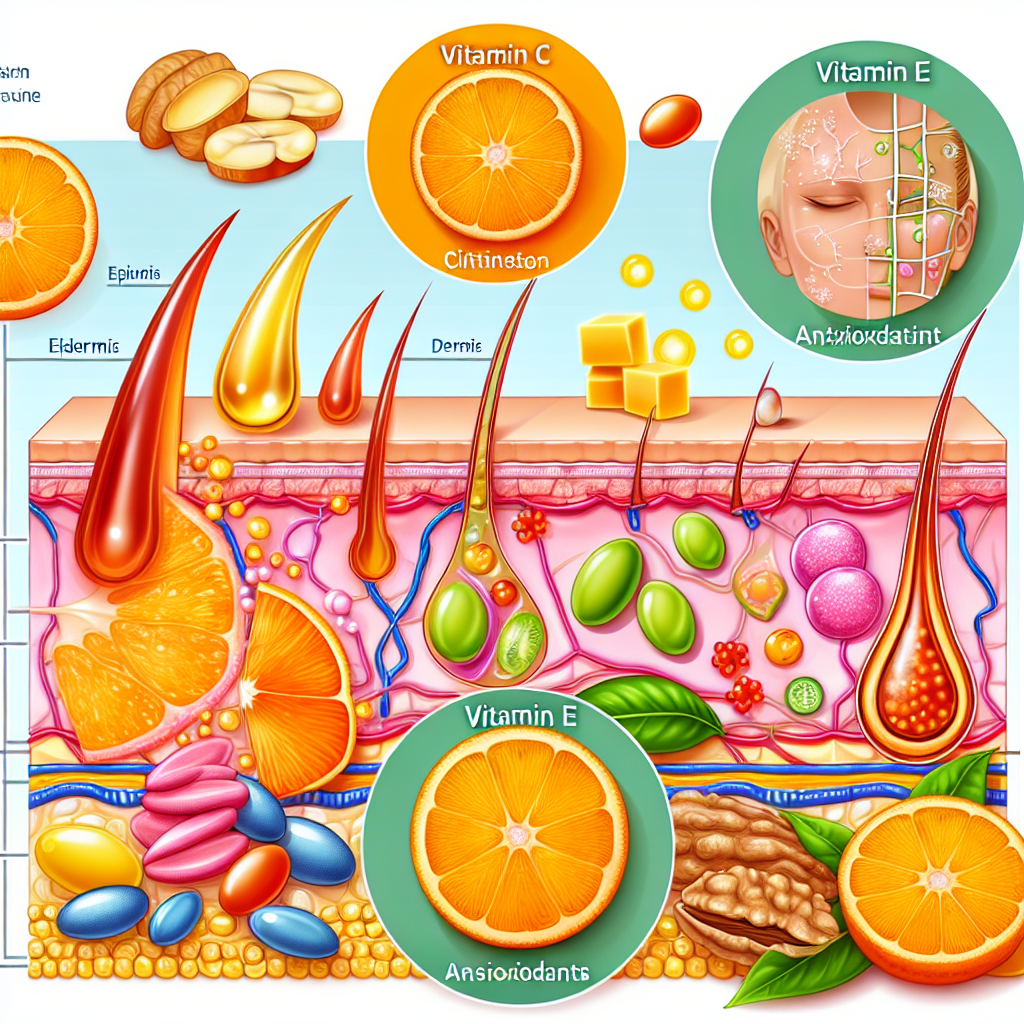How Vitamin C and E Keep Your Skin Glowing

Discover the secret to radiant skin with Vitamins C and E! These essential nutrients work wonders in maintaining your skin’s glow and health. Don’t wait, learn more about how you can incorporate these vitamins into your skincare routine. Click here to start your journey towards vibrant and glowing skin.
The Role of Vitamin C and E in Achieving Radiant Skin
The quest for radiant, glowing skin is a journey that many embark on, but few truly understand the science behind achieving this coveted glow. The secret to radiant skin lies not only in the products we apply topically but also in the nutrients we consume. Among these nutrients, vitamins C and E play a pivotal role in maintaining and enhancing the health and glow of our skin.
Vitamin C, also known as ascorbic acid, is a potent antioxidant that is crucial for the health of our skin. It plays a significant role in collagen synthesis, which is the process that helps maintain the elasticity and firmness of our skin. As we age, our skin’s natural collagen production decreases, leading to the formation of wrinkles and fine lines. By boosting collagen production, vitamin C helps to combat these signs of aging, resulting in a smoother, more youthful complexion.
Moreover, vitamin C is renowned for its ability to brighten the skin. It inhibits the enzyme tyrosinase, which is responsible for converting tyrosine into melanin, the pigment that gives our skin its color. By inhibiting this enzyme, vitamin C helps to reduce hyperpigmentation and dark spots, leading to a more even and radiant skin tone.
On the other hand, vitamin E, also known as tocopherol, is another powerful antioxidant that works synergistically with vitamin C to protect the skin from damage. It is fat-soluble, meaning it can penetrate deep into the layers of the skin to neutralize harmful free radicals. These free radicals are unstable molecules that can damage the skin cells, leading to premature aging and dullness.
Vitamin E also has anti-inflammatory properties, which can help to soothe and calm irritated skin. It strengthens the skin’s barrier function, helping to lock in moisture and keep the skin hydrated. Hydrated skin is plump and glowing, so maintaining your skin’s moisture levels is key to achieving that radiant glow.
Furthermore, when vitamin C and E are used together, they provide a powerful defense against sun damage. They work together to neutralize free radicals produced by UV exposure, preventing sunburn and reducing the risk of skin cancer. They also help to repair any existing sun damage, reducing the appearance of sun spots and improving the overall texture and tone of the skin.
In conclusion, vitamins C and E are essential for maintaining the health and radiance of our skin. They work together to boost collagen production, brighten the skin, protect against sun damage, and keep the skin hydrated. Incorporating these vitamins into your skincare routine and diet can help you achieve that coveted glow. However, it’s important to remember that while these vitamins can significantly improve the health and appearance of your skin, they are not a substitute for a comprehensive skincare routine and a healthy lifestyle. Always remember to cleanse, exfoliate, and moisturize your skin regularly, and don’t forget to protect your skin from the sun. With the right care and nutrients, radiant, glowing skin is within your reach.
Unlocking the Secrets of Glowing Skin: The Power of Vitamins C and E

Unlocking the secrets of glowing skin is a quest that has been pursued by many for centuries. In the modern era, the pursuit of a radiant complexion has led to the discovery of the powerful role that vitamins play in skin health. Among these, vitamins C and E have emerged as potent allies in maintaining and enhancing the skin’s natural glow.
Vitamin C, also known as ascorbic acid, is a water-soluble vitamin that is essential for the synthesis of collagen, a protein that provides structure and elasticity to the skin. By promoting collagen production, vitamin C helps to keep the skin firm and reduce the appearance of wrinkles. Moreover, it is a potent antioxidant that protects the skin from damage caused by free radicals, unstable molecules that can cause oxidative stress and premature aging.
The antioxidant properties of vitamin C also make it effective in reducing skin discoloration. It inhibits the enzyme tyrosinase, which is responsible for the production of melanin, the pigment that gives skin its color. By doing so, vitamin C can help to fade dark spots and even out skin tone, contributing to a brighter, more radiant complexion.
In addition to its standalone benefits, vitamin C enhances the effectiveness of other skin care ingredients. For instance, it increases the photoprotective properties of sunscreen, providing additional defense against harmful ultraviolet (UV) radiation.
Like vitamin C, vitamin E is a powerful antioxidant that protects the skin from oxidative stress. However, as a fat-soluble vitamin, it has a unique set of benefits. Vitamin E is known for its moisturizing properties, which help to keep the skin hydrated and prevent dryness. It also strengthens the skin’s barrier function, helping to lock in moisture and keep out harmful substances.
Vitamin E has been shown to reduce inflammation, a key factor in many skin conditions, including acne and eczema. By soothing inflammation, it can help to calm irritated skin and promote a smoother, healthier complexion.
Furthermore, vitamin E works synergistically with vitamin C to enhance its antioxidant effects. When used together, these vitamins provide a powerful defense against environmental damage, including UV radiation and pollution. This not only helps to prevent premature aging but also promotes skin healing, reducing the appearance of scars and other skin imperfections.
In conclusion, vitamins C and E are essential for maintaining and enhancing the skin’s natural glow. By promoting collagen production, reducing discoloration, and protecting against environmental damage, these vitamins help to keep the skin healthy and youthful. Moreover, their moisturizing and anti-inflammatory properties contribute to a smoother, more radiant complexion.
While these vitamins can be obtained through a balanced diet, they are also available in various skin care products, including serums, creams, and lotions. By incorporating these products into your daily skin care routine, you can harness the power of vitamins C and E to achieve the glowing skin you’ve always desired.
Remember, though, that while vitamins C and E are powerful tools in the quest for glowing skin, they are not a substitute for a comprehensive skin care routine that includes cleansing, exfoliating, and protecting your skin from the sun. With a balanced approach to skin care, you can unlock the secrets of glowing skin and enjoy a radiant, healthy complexion.
How Vitamins C and E Contribute to a Healthy, Glowing Complexion
Vitamin C and E are two essential nutrients that play a significant role in maintaining a healthy, glowing complexion. These vitamins are potent antioxidants that protect the skin from harmful free radicals, promote collagen production, and help to repair damaged skin cells.
Vitamin C, also known as ascorbic acid, is a water-soluble vitamin that is crucial for the synthesis of collagen, a protein that provides structure and elasticity to the skin. As we age, our skin’s natural collagen production decreases, leading to the formation of wrinkles and fine lines. By promoting collagen synthesis, vitamin C helps to maintain the skin’s firmness and elasticity, thereby reducing the appearance of these aging signs.
Moreover, vitamin C is a powerful antioxidant that protects the skin from the damaging effects of free radicals. Free radicals are unstable molecules that can cause oxidative stress, leading to premature skin aging and various skin disorders. By neutralizing these harmful molecules, vitamin C helps to prevent skin damage and maintain a youthful, glowing complexion.
In addition to its antioxidant properties, vitamin C also plays a crucial role in skin brightening. It inhibits the enzyme tyrosinase, which is responsible for the production of melanin, the pigment that gives skin its color. By reducing melanin production, vitamin C helps to lighten hyperpigmentation and dark spots, resulting in a more even skin tone.
On the other hand, vitamin E, also known as tocopherol, is a fat-soluble vitamin that is renowned for its potent antioxidant and moisturizing properties. Like vitamin C, vitamin E protects the skin from the damaging effects of free radicals. However, it also has the unique ability to absorb the energy from ultraviolet (UV) light, which makes it an excellent natural sunscreen. By reducing UV-induced skin damage, vitamin E helps to prevent the formation of wrinkles, fine lines, and dark spots.
Furthermore, vitamin E is a natural emollient that helps to moisturize the skin and improve its texture. It strengthens the skin’s barrier function, preventing moisture loss and keeping the skin hydrated and supple. This is particularly beneficial for individuals with dry or mature skin, as it helps to combat dryness and flakiness, resulting in a smoother, healthier complexion.
In conclusion, vitamins C and E are essential for maintaining a healthy, glowing complexion. They protect the skin from free radical damage, promote collagen production, and help to repair damaged skin cells. Moreover, they also have skin brightening and moisturizing properties that contribute to a more even skin tone and improved skin texture. Therefore, incorporating these vitamins into your skincare routine can significantly enhance your skin’s health and appearance. Whether you choose to consume them through your diet or apply them topically through skincare products, these vitamins are sure to keep your skin glowing and youthful.